Iran Nuclear Dispute Could Split World Community
Iran Nuclear Dispute Could Split World Community
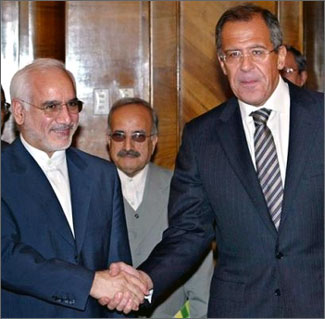
LONDON: After months of tough bargaining, Iranian and European negotiators have reached the end of the line. The Western effort to prevent Iran from reprocessing nuclear fuel may now cause a bigger split with the developing world.
To the disappointment of the US and the European Union Troika (EU3) – Britain, France, and Germany – the latest International Atomic Energy Agency (IAEA) report on Iran's nuclear program fell short of the critical declaration for which the Western nations were hoping.
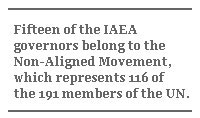
Indeed, the document said that the IAEA tests vindicated Tehran's claims that traces of enriched uranium found two years earlier at the Iranian nuclear facilities were from the imported equipment, believed to be of Pakistani origin. Unsurprisingly, Washington immediately dismissed this IAEA finding as meaningless.
Equally disappointing to the Europeans and the United States was the report by the prestigious London-based International Institute for Strategic Studies that followed soon thereafter. The report revealed that Iran would need more than 10 years to build an industrial-scale centrifugal plant at Natanz, where a relatively small pilot centrifugal plant currently exists.
By now, the European frustration with Iran is palpable – and is shared by Washington. Such a convergence should easily gain them a majority at the 15-strong United Nations Security Council – where four of the five permanent members are European or American – to punish Tehran for its refusal to permanently abdicate its right to enrich uranium.
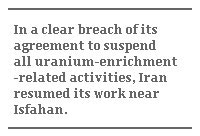
Unfortunately for the Western powers, the nuclear matter may be referred to the Security Council only by the IAEA's Board of Governors, and the composition of the 35-member Board is not as iniquitous as the UN Security Council. Fifteen of the IAEA governors belong to the Non-Aligned Movement (NAM), which represents 116 of the 191 members of the UN.
The principle underlying the current spat over uranium enrichment is this: Does the developing world have the right to develop and use all nuclear technology, including uranium enrichment?
Tehran's answer is an unequivocal "Yes," and the NAM agrees. The Europeans do not deny that right; they wants Iran to permanently cede its prerogative in exchange for an EU commitment to construct nuclear power plants in the Islamic Republic and strengthen commercial links with Iran.
Signing such a deal would render Iran totally dependent on the EU for its civilian nuclear power plants and the fuel needed to run them – a fundamental negation of aims of the 1979 revolution in Iran: regaining Iranian independence and sovereignty.
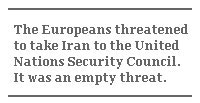
"For Iran, nuclear technology is a source of national pride and a demonstration of its political and technological independence from its former colonial masters," says Daryl Kimball, executive director of Arms Control Association, a non-partisan organization that researches nuclear issues. Kimball adds, "This is much more complicated than a simple economic and energy calculation."
For their part, the Iranians have concentrated on fulfilling the European demands for a nuclear program geared toward civilian, not military, operations. In March, they submitted to European negotiators detailed proposals for strict IAEA monitoring of their nuclear program. The outlined regime extended far beyond the provisions of the Additional Protocol on the nuclear Nonproliferation Treaty (NPT), which they signed in December 2003. But Iran also repeatedly ruled out the prospect of permanently renouncing their right to develop nuclear technology.
The framework that the EU3 proposed to Tehran in early August made commercial incentives and building of nuclear electric generating plants conditional on Iran's permanent renunciation of its rights under the nuclear NPT. The framework also included the demand that Iran sign a legal agreement not to quit the NPT – as North Korea had – under any circumstances.
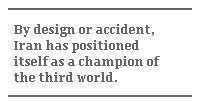
Tehran rejected the package. In a clear breach of its agreement to suspend all uranium-enrichment-related activities, Iran resumed its work at the plant near Isfahan, where uranium oxide is converted to uranium hexafluoride gas – but only under the watchful eyes of the IAEA inspectors. This gas is the feedstock for centrifuges that enrich uranium to varying degrees: 4 percent for power plants, 20 percent for research reactors, and 90 percent-plus for weapons.
In response to the rejection, the Europeans threatened to take Iran to the United Nations Security Council. It was an empty threat.
At the IAEA governors' emergency meeting in Vienna, the EU3 and the US discovered that they actually lacked the wide majority they had sought. So they settled for asking Iran to suspend its activities related to uranium enrichment, and for the IAEA secretary-general Muhammad El Baradei to report on the issue by September 3.
El Baradei's 15-page document proved to be a mixed bag. While insisting that Iran maintain transparency, the report did not invalidate the IAEA's earlier conclusion that it had not found evidence that Iran was engaged in a banned nuclear weapons program.
The plain fact is that the only valid basis for hauling Iran before the UN Security Council is its breach of the global nuclear non-proliferation regime as enshrined in the NPT. Following the IAEA emergency meeting, Russia – which is about to finish constructing a civilian nuclear power plant near Bushehr – said that it saw no evidence that Tehran was violating the non-proliferation regime.
At the IAEA emergency session, among those who remained coolly cognizant of the facts on the ground were the IAEA governors belonging to the NAM, including such heavyweights as Brazil, India, Indonesia, and South Africa.
Rajmah Hussein of Malaysia, the current NAM chairman, reiterated NAM's position that all countries have "a basic and inalienable right" to develop atomic energy for peaceful purposes.
NAM members note that while Western nations repeatedly ask why Iran is so insistent on building nuclear power plants when the country has vast reserves of oil and natural gas, they never pose the same question to the Russians, who have built a large number of nuclear power plants despite having the largest natural gas reserves in the world. In any event, according to a recent estimate by British Petroleum, oil consumption in Iran was rising so fast that the country would become a net oil importer by 2024.
By design or accident, Iran has positioned itself as a champion of the third world, with the courage and conviction to stand up to the Western powers. This has won it quiet admiration from many NAM governors, who fear that the limitations imposed on Iran could eventually extend to them. The experience of the past few months has made it clear that any further pressure on Iran to relinquish its right to uranium enrichment at the forthcoming quarterly meeting of the IAEA Governors will likely cause an open fissure with the developing world. The double standard applied in implementing nonproliferation is coming home to roost.
Dilip Hiro’s latest book is The Iranian Labyrinth: Journeys Through Theocratic Iran and its Furies [Nation Books].